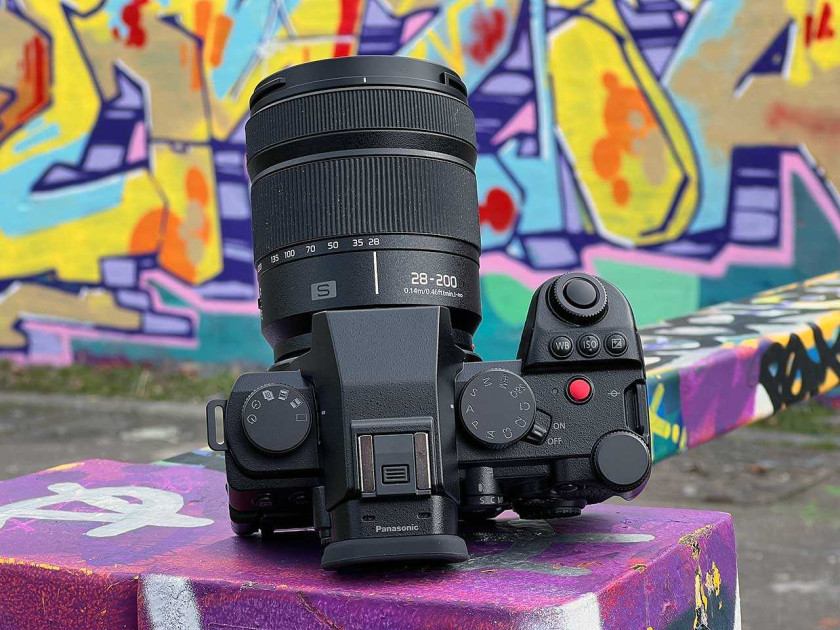
[ad_1]
Introduction
The Lumix S 28-200 mm F4-7.1 MACRO O.I.S. (S-R1428) is a versatile wide-angle to telephoto 7.14x zoom lens for the Panasonic, Sigma and Leica “L-mount” full-frame mirrorless camera system.At the time of writing, it is officially the World’s smallest and lightest full-frame mirrorless lens with an optical zoom of 7x or more.This lens features a variable maximum aperture of f/4-f/7.1 and has 9 rounded diaphragm blades for smoother bokeh.It is comprised of 17 elements in 13 groups, including one aspherical element, four ED (Extra-Low Dispersion) elements, and one UHR (Ultra High Refractive Index) element.The Panasonic 28-200mm has a closest focusing distance of 0.14m / 0.46ft and a maximum magnification of 0.50x.It boasts a dust, splash and freeze resistant design that can operate at 10 degrees below zero.In conjunction with the camera body’s built-in image stabilisation, you can benefit from up to 6.5 stops of stabilisation when using this lens.The Lumix S 28-200 mm F4-7.1 MACRO O.I.S. is available now priced at £899.99 / €999.99 / $799.99 in the UK, Europe and the USA respectively.
Ease of Use
The Panasonic Lumix S 28-200 mm F4-7.1 MACRO O.I.S. is an incredibly small, compact and very light wide-to-tele zoom lens, measuring 9.34cm / 3.68inch in length, 7.3cm / 3.04inch in diameter and weighing in at just 413g / 0.91lb.
When mounted on the Lumix S5IIX mirrorless camera that Panasonic sent us for testing, the Lumix S 28-200mm lens feels extremely well-balanced and suitable for both two-handed and one-handed use.
Note that this new lens does extend when zoomed from the minimum 28mm focal length to the 200mm focal length by an additional 5cm.
Build quality is very good. The Panasonic 28-200 mm F4-7.1 MACRO O.I.S. feels solid enough in your hand, even if it is mostly made out of plastic, with a metal lens mount.
It’s also weather-proof, being both dust and splash resistant and working all the way down to -10 degrees. We successfully used it in more inclement conditions with no adverse effects.
There’s also a a fluorine coating on the front lens element to help repel water, oil, and any other contaminants, as well as making it easier to clean.
There is also built-in image stabilisation, with the lens offering up to 6.5-stops of 5-Axis Dual I.S. when used with a compatible camera body.
In terms of external controls, there are just two – a focus mode switch with the standard AF/MF settings and an On/Off switch for the optical image stabilisation (O.I.S.).
The Panasonic 28-200 mm F4-7.1 MACRO O.I.S. lens has a fairly narrow focus ring at the end of barrel with a ridged, rubberised grip band.
There are no hard stops at both ends of the range, making it more difficult to set focus at infinity.
Polariser users should be pleased that the 67mm filter thread doesn’t rotate on focus.
When it comes to auto-focusing, the Panasonic Lumix S 28-200 mm F4-7.1 MACRO O.I.S. is a fairly quick performer, taking around 0.15 seconds to lock onto the subject when mounted on the Panasonic S5IIX camera that we tested it with.
We didn’t experience too much “hunting”, either in good or bad light, with the lens accurately focusing virtually all of the time in the single AF-S mode.
The linear motor focusing mechanism is very quiet, in fact virtually silent, making this lens well-suited to video recording as well as candid stills photography.
The lens ships with a large, petal-shaped, high quality lens hood (S-R28200) with a lock button, but there’s no case included.
Focal Range
The 28mm focal length provides an angle of view of 75 degrees.
28mm
The 200mm focal length provides an angle of view of 12 degrees.
200mm
Chromatic Aberrations
Chromatic aberrations, typically seen as purple or blue fringes along contrasty edges, are not a problem for the Panasonic Lumix S 28-200 mm F4-7.1 MACRO O.I.S. lens, even in areas of very high contrast.
28mm
200mm
Vignetting
With the lens set to its maximum aperture, there is some obvious light fall-off in the corners especially at the wider focal lengths, requiring you to stop down by at least 3 f-stops to completely prevent it.
28mm
200mm
Distortion
The Panasonic Lumix S 28-200 mm F4-7.1 MACRO O.I.S. exhibits some mild barrel and pin-cushion distortion which will you need to correct in post-processing.
14mm
200mm
Sunstars and Flare
The Panasonic Lumix S 28-200 mm F4-7.1 MACRO O.I.S. doesn’t produce very nice, sharp sunstars even when stopped-down to f/22 or smaller, and it’s also prone to flare when shooting directly into the sun, even if you have the supplied lens hood fitted.
28mm
200mm
Macro
The Panasonic Lumix S 28-200 mm F4-7.1 MACRO O.I.S. offers very good close-up performance for such a wide-angle zoom lens, with a close focus point of 0.14m / 0.46ft from the sensor plane at the 28mm focal length.
Bokeh
Bokeh is a word used for the out-of-focus areas of a photograph, and is usually described in qualitative terms, such as smooth / creamy / harsh etc.
In the Lumix S 28-200 mm F4-7.1 MACRO O.I.S. lens, Panasonic have employed an iris diaphragm with 9 rounded blades, which has resulted in quite nice bokeh in our view for such an all-encompassing zoom lens.
We do realise, however, that bokeh evaluation is subjective, so we’ve included several examples below for your perusal.
Sharpness
In order to show you how sharp the Panasonic Lumix S 28-200 mm F4-7.1 MACRO O.I.S. lens is, we are providing 100% crops on the following pages.
[ad_2]






